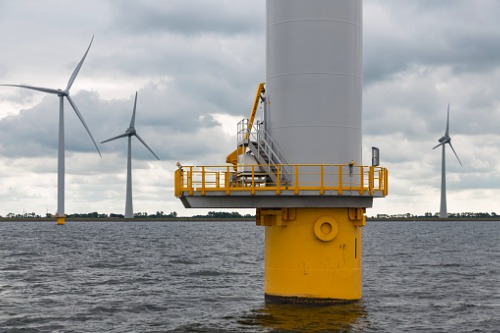Aviva enters growing offshore wind insurance marketplace

As a leader in onshore wind, Aviva is now moving to insure risks in the offshore field.This is a growing area with new offshore wind projects totalling 108GW projected for the UK and Europe by 2030Aviva is committed to renewable energy and its renewables portfolio is now more than 200% of the size of the fossil fuel book it exited in 2019The insurer has further strengthened its position in renewables by launching its own stand-alone policy wording for battery electric storage systems (BESS), as well as launching an Electric Vehicle Charging Point proposition
Aviva has reaffirmed its commitment to sustainability by extending its renewable energy insurance offering into the growing offshore wind market.
The insurer – the first worldwide to set a target of reaching Net Zero by 2040 – exited the London Market for insurance of standalone operational fossil fuel power generation in 2019 and now focusses on renewable energy. This approach supports the UK’s transition to becoming climate-ready.
Its portfolio in renewable energy encompasses onshore wind, solar power, EV charging points and battery energy storage systems (BESS), and is now more than 200% of the size of the fossil fuel book it exited, covering enough renewable energy to offset 31.5 million tonnes of CO2 annually, the carbon equivalent of driving 96bn miles.
Demonstrating its commitment to green energy assets, Aviva is already a leading provider of insurance for renewable energy in the London Market with an ambition to become the number one insurer of renewable energy in the UK by 2027. Aviva’s entrance into the offshore wind market extends its underwriting appetite and risk capabilities, and it has already insured its first risk in the North Sea.
Aviva is offering construction all-risks and operational risks cover in offshore wind as a follow market, focussing on large renewable energy clients and projects in the UK, US and Europe, working with experienced brokers and following recognised leaders.
The insurer will be supporting existing clients as they move into offshore wind with coverage aimed at windfarm developers, owners and operators.
Aviva has pledged to achieve Net Zero by 2040 and in November we set out our commitment to help support the UK to become the most climate-ready large economy by 20302. Supporting our growing renewable energy industry, both on and offshore, is a critical part of achieving that ambition.
Adam Winslow, CEO of Aviva UK & Ireland General Insurance, said: “Aviva has a strong reputation as a lead insurer in onshore renewables and we know there is strong demand in offshore as we see this market rapidly evolve.
“Aviva has pledged to achieve Net Zero by 2040 and in November we set out our commitment to help support the UK to become the most climate-ready large economy by 2030. Supporting our growing renewable energy industry, both on and offshore, is a critical part of achieving that ambition.
“With more offshore wind projects coming on-stream all the time and many others in the planning, development and construction phases, this is a growth area and we look forward to bringing our expertise and experience to bear in this exciting space.”
Aviva has further strengthened its position in the renewables market, stepping up its involvement in BESS.
Batteries allow electricity from intermittent renewable energy sources, such as solar or wind, to be stored and then released as needed and have a major role to play in the economy’s transition from fossil fuels to renewables.
Aviva has many years of experience in insuring BESS but has now developed its own stand-alone policy wording for this technology.
The insurer is also looking to expand its underwriting and risk management team in support of its renewables proposition.
The rationale for Aviva’s move away from carbon-intensive industries is outlined in its ESG Baseline Underwriting Statement, which specifies the risks that it will no longer insure, including:
The construction of coal-fired power stationsThe construction or operation of thermal coal minesPower generation risks that generate power from coalAny new fossil fuel mining or extraction projectsOffshore oil and gas rigs and platforms
As an investor, Aviva has been involved in offshore wind projects for a number of years. In 2018 it provided £400m of financing to help fund the construction of Hornsea One, off the Yorkshire coast, which can power more than one million homes with green electricity.
More recent investments include East Anglia One, off the Suffolk coast, which has capacity for powering more than 600,000 homes.
Aviva received validation of its science-based targets following approval from the Science Based Targets initiative (SBTi). The approval of the targets, aligned to a 1.5°C pathway for operations, supply chain and investments, are a key milestone in Aviva’s journey to become a Net Zero company by 2040.
Authored by Aviva





